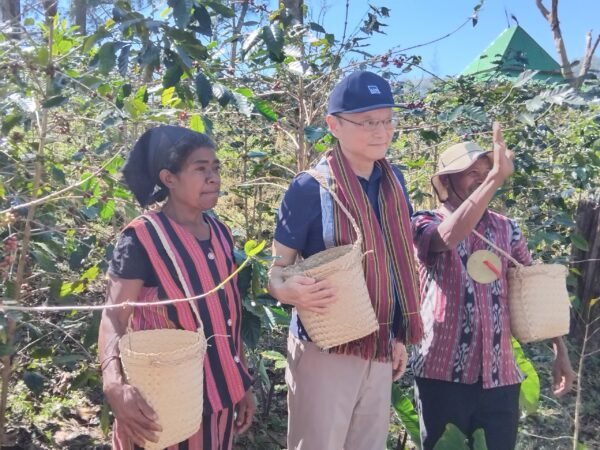Aileu, July 22, 2025 (Média Democracia) – Members of the Viveirus Group expressed their happiness over the visit of the President of the Asian Development Bank (ADB), who came to observe their productive activities currently being carried out in Madabenu Village, Aileu Municipality. The visit took place this Monday.
In an interview, Cazimeira da Silva Granadeiro, a member of the Viveirus Coffee Group in Madabenu Village, Aileu, explained that the coffee seedling process starts by preparing a mixture of original black soil and ordinary black soil, then placing it in polybags for planting the seedlings. These coffee seedlings were just planted this month.
“We mix the original black soil with the ordinary black soil, and only after that do we place it in polybags to plant the coffee seedlings. We previously planted around 1,300 seedlings, both large and small, specifically of the Arabica variety,” said Cazimeira da Silva Granadeiro.
She continued, explaining that the seeds and seedlings came from the CALIP project in Fatukeru and were later brought to be planted in the current location.
“Our group consists of 25 members, and we are grateful to have received training from ADB on how to plant coffee seedlings, how to prepare the soil, and how to water the plants. Up until now, we continue to follow everything ADB has taught us. We also appreciate the support ADB has given us, including tarpaulins, coffee pulping machines, drying nets, and large buckets,” she added.
Another group member, Angela Castro from Madabenu, shared that the Viveirus Madabenu 2 Group, composed of 25 people, was established in 2022 and focuses on coffee cultivation and collection.
Each of the 25 members has their own plot of land. Angela noted that the coffee trees have improved slightly, as previously the branches did not produce well, but after pruning, the trees grew again and started producing more fruit.
“I feel that now the coffee bears more fruit than before we started pruning. During this harvest, the trees are more productive, and one tree can yield up to three kilograms. After we finish harvesting, we dry the coffee and then sell it for $3.00 per kilo. But when buyers come directly to our homes, we only receive $2.50 per kilo. If the coffee fruit isn’t dry yet, it’s only valued at around $0.60 per kilo,” said Angela Castro.
The group felt extremely proud to receive a visit from the ADB President, especially to such a remote area. They asked ADB to continue supporting their activities through further equipment assistance and agricultural training, so they can increase their income and better support their families’ needs.
Reporter: Domingas
Photo: Domingas

